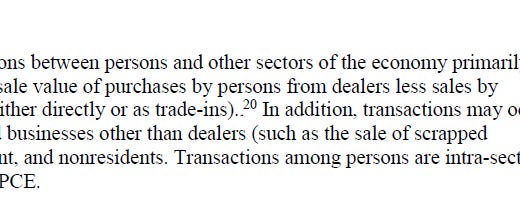Best of #econtwitter - Week of May 1, 2022 [2/3]
May 02, 2022
Welcome readers old and new to this week’s edition of Best of Econtwitter. Thanks to those sharing suggestions, over email or on Twitter @just_economics.
This is part two of three.
Paper summary threads

Alex Chinco@AlexChinco
Pumped to see this paper in print! Had a blast working on it with @SamHartzmark and @abbysussman!
Asset-pricing researchers spend a lot of time thinking about risk factors. We develop a survey-based method for figuring out which ones matter to investors. A 🧵…

Journal of Finance @JofFinance
Forthcoming soon: @AlexChinco @Baruch_Zicklin @SamHartzmark @abbysussman @ChicagoBooth find that participants in survey experiments respond to mean and volatility of returns consistent with standard models, but not to correlation with consumption growth. https://t.co/r5k1kbhrRk
6:36 PM · Apr 29, 2022
13 Reposts · 82 Likes

Emil Verner@EmilVerner
Identification in macro from the JPE in 1937 (!!)
Norway and Denmark experienced deflation and recessions in 1925-28 because they attempted to return to pre-war gold parities. Sweden and Finland did not and enjoyed a boom throughout the 1920s
jstor.org/stable/1824241…

12:47 AM · Apr 26, 2022
35 Reposts · 181 Likes

Alistair Macaulay@AlistairMacaul7
Q: Why are households uncertain about inflation? And does the source of that uncertainty matter?
@jmoberly_econ and I have a new working paper on this, using novel survey data from Germany.
A: Large heterogeneity in the data ➡️ big amplifier of shocks.
drive.google.com/uc?export=down…

1:59 PM · Apr 26, 2022
28 Reposts · 100 Likes

Galo Nuño@NunoGalo
How do asset purchases by central banks work?
Duration risk extraction is typically considered the key channel, but it is hard to square with the European experience during the Covid outbreak.
A short thread🧵:

10:44 PM · Apr 29, 2022
49 Reposts · 286 Likes

Douglas Irwin@D_A_Irwin
Why was there was so much trade liberalization in pivotal decade of 1985-95 - creating globalized world of today? Thread on new paper 1/7

2:11 PM · Apr 26, 2022
204 Reposts · 783 Likes

Karl Harmenberg@KHarmenberg
Our paper (w/ Tobias Broer, Per Krusell, and @ek_oberg) on rigid wage contracts is forthcoming in AER: Insights! Here comes a thread about the paper, some comments on the new-Keynesian model based on the results in the paper, and some fun history.
1/12

AEA Journals @AEAjournals
Forthcoming in AER: Insights: "Macroeconomic Dynamics with Rigid Wage Contracts" by Tobias Broer, Karl Harmenberg, Per Krusell, and Erik Öberg. https://t.co/WdBBHb8XGi
2:09 PM · Apr 27, 2022
18 Reposts · 107 Likes

John Paul Koning@jp_koning
Here's the definitive study of El Salvador's bitcoin experiment. To measure bitcoin usage, the authors rely on survey data gathered from face-to-face interviews with 1,800 Salvadorean households.
davidargente.com/_files/ugd/b05… ht @alvafer64

5:32 PM · Apr 27, 2022
197 Reposts · 598 Likes

Chris M. Herbst@ChrisMHerbst
Really excited to share my new paper with @JHB_econ, out today in JOLE, which attempts to answer a relatively straightforward but really policy-relevant question:
To what extent is the #childcare market sensitive to macroeconomic conditions?
journals.uchicago.edu/doi/10.1086/71…

5:52 PM · Apr 27, 2022
55 Reposts · 236 Likes

Erika McEntarfer@ErikaMcentarfer
Did the pandemic force many workers into early retirement? Can we expect older workers to return to the labor market when the pandemic is over? New working paper🧵
Labor force participation workers 55 and older:

6:11 PM · Apr 28, 2022
40 Reposts · 193 Likes
National accounts pop-up section

Noah Smith 🐇🇺🇦@Noahpinion
Jesus Christ, New York Times. What kind of economic journalism is this??
IMPORTS DO NOT SUBTRACT FROM GDP!!!
Imports subtract from exports but they add to consumption!! They're simply neutral for GDP!!


3:31 PM · Apr 28, 2022
403 Reposts · 3.2K Likes

David Baqaee@DBaqaee
@ShengwuLi @nytimes FYI, from a pure accounting perspective, what @Noahpinion said in that thread is not correct. Imported intermediate inputs do show up as negative numbers in nominal GDP --- they don't cancel.
10:10 PM · Apr 28, 2022
2 Reposts · 61 Likes
^branching threads

Guido Lorenzoni@guido_lorenzoni
I am not quite sure what this discussion was about. But I think we can safely say, in agreement with @Noahpinion, that there is no economic transaction that causes a negative number to be added to measured GDP

Noah Smith 🐇🇺🇦 @Noahpinion
Jesus Christ, New York Times. What kind of economic journalism is this??
IMPORTS DO NOT SUBTRACT FROM GDP!!!
Imports subtract from exports but they add to consumption!! They're simply neutral for GDP!! https://t.co/NOg3VEmOcy
4:39 PM · Apr 29, 2022
18 Reposts · 186 Likes
^thread

Gabriel Chodorow-Reich@gchodorowreich
Answer to below: Exports⬆️, consumption (PCE)⬇️ due to intersectoral net transactions, GDP unchanged. This treatment creates the possibility that PCE could be negative, if U.S. households sold enough cars to foreigners and didn't buy anything else! From bea.gov/resources/meth…:



Gabriel Chodorow-Reich @gchodorowreich
Apropos of this thread, here is a national accounting quiz. A U.S. resident buys a new car in 2021 and in 2022 sells the car to someone in Canada. Do 2022 U.S. exports go up? Does 2022 U.S. GDP? What if anything else changes? Explain your answer. https://t.co/lepJYhnKtZ
7:23 PM · May 1, 2022

devcroix ⚔️ 🏵@devarbol
💵 = 🍰 + 🏗 + 🏛 + 🌐
1:03 PM · Apr 30, 2022
1 Repost · 15 Likes

Khoa Vu@KhoaVuUmn
"You said you are a doctor? We have someone on board who just collapsed."
"Sorry, I'm not that kind of doctor. I'm an economist."
"Great, this guy collapsed when he read about how GDP is calculated."
"Sorry, I'm not that kind of economist..."
12:01 PM · Apr 29, 2022
134 Reposts · 1.88K Likes
And from the archives:

JW Mason@JWMason1
In a very real sense, all empirical macroeconomics is a study of the social process by which a person working at a staistical agency comes to enter a particular number into a spreadsheet. We forget that at our peril.
1:40 PM · Aug 21, 2018
70 Reposts · 263 Likes

